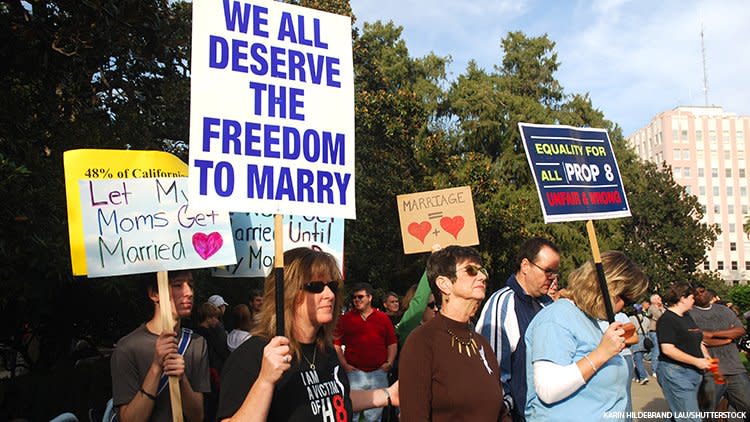Prop. 8 Trial Tapes Will Be Available for Public Viewing

The U.S. Supreme Court has cleared the way for release of videotapes from the trial over Proposition 8, the ballot measure that temporarily voided marriage equality in California and was eventually struck down.
The court Tuesday declined to take up an appeal by Prop. 8 supporters to keep the tapes sealed permanently. A 10-year embargo on the tapes expired in 2020, but the court case had kept them from public view past that date.
Voters approved Prop. 8 in November 2008, a few months after the California Supreme Court had ruled in favor of marriage equality. Prop. 8 amended the California constitution to ban same-sex marriage, therefore invalidating the court’s decision. Two same-sex couples filed a federal lawsuit against Prop. 8, saying it violated the U.S. Constitution.
U.S. District Judge Vaughn Walker ruled in 2010 that Prop. 8 was unconstitutional, but supporters of the proposition appealed; California officials declined to defend the measure in court. The U.S. Supreme Court ruled in 2013 that Prop. 8 proponents did not have legal standing to argue for it in court, therefore letting Walker’s ruling stand.
Walker had placed the embargo on the videotapes, but as it neared expiration, San Francisco public broadcaster KQED filed a motion with the U.S. Court of Appeals for the Ninth Circuit to unseal them. That motion was granted, then appealed by some Prop. 8 proponents, who argued the tapes should remain sealed permanently.
District Court Judge William H. Orrick dismissed that case in July 2020, and Prop. 8 supporters then appealed to the U.S. Supreme Court, claiming that releasing the tapes could lead to harm or harassment of anyone directly involved in the trial. But the high court declined to hear that appeal.
The fight to release the tapes was led by Scott Shafer, the journalist who covered the Prop. 8 trial for KQED and now cohosts its Political Breakdown show. “As someone who sat through the entire Prop. 8 trial, I witnessed some very dramatic and moving testimony as well as riveting cross-examinations,” Shafer, a gay man, said in a KQED press release. “I’m glad others will now get to view this important part of the historical record.”
It's unclear exactly when the tapes will be accessible for public viewing, but federal court officials told KQED this will happen soon and that the recordings will be on a “publicly available site.”
Walker told KQED that making the tapes available was the right thing to do, and the Californians who challenged Prop. 8 praised the move as well.
“Since the 2010 ruling striking down Proposition 8, we have fought to have the video record of our historic trial shared with the public,” Kris Perry, one of the original plaintiffs, told KQED. “There is no more important time to expose the discriminatory rhetoric of proponents and the courage of the experts, attorneys, and plaintiffs in standing up against hate. Even though it’s been 12 years since our ruling, we know the fight for marriage equality and many other basic civil rights is still essential, and this video shows the evidence for why.”

